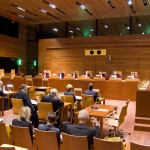 A new article in the latest issue of Politics & Governance deals with the role of transparency in interinstitutional politics. The question of transparency is widely regarded as a thermometer of the relation between the Council of the EU and the public at large. Relatively little attention however has been devoted to the implications of transparency (i.e., access for the general public) for inter-institutional information politics, even when the limited evidence suggests that the connection is considerable. The current publication asks how EU actors use Council transparency as a platform and for what reason. It approaches transparency as a policy that is developed in three arenas: the internal, the external political, and the external judicial arena. The article finds strong evidence in support of the view that the Council’s transparency policy played a central role in EU institutions’ attempt to advance their information ambitions. By strongly engaging with the issue of transparency particularly the European Parliament and its members succeeded at expanding their institutional information basis in an area where their political grip was traditionally at its weakest: the Foreign Affairs Council. Acting in turn as a bargaining chip, a political lever, or an alternative to institutional information, the Foreign Affairs Council’s transparency policy was thus clearly used to advance information agendas of oversight and legislative prerogatives.
A new article in the latest issue of Politics & Governance deals with the role of transparency in interinstitutional politics. The question of transparency is widely regarded as a thermometer of the relation between the Council of the EU and the public at large. Relatively little attention however has been devoted to the implications of transparency (i.e., access for the general public) for inter-institutional information politics, even when the limited evidence suggests that the connection is considerable. The current publication asks how EU actors use Council transparency as a platform and for what reason. It approaches transparency as a policy that is developed in three arenas: the internal, the external political, and the external judicial arena. The article finds strong evidence in support of the view that the Council’s transparency policy played a central role in EU institutions’ attempt to advance their information ambitions. By strongly engaging with the issue of transparency particularly the European Parliament and its members succeeded at expanding their institutional information basis in an area where their political grip was traditionally at its weakest: the Foreign Affairs Council. Acting in turn as a bargaining chip, a political lever, or an alternative to institutional information, the Foreign Affairs Council’s transparency policy was thus clearly used to advance information agendas of oversight and legislative prerogatives.
Tag: secrecy

Kadi is back in Luxembourg and with a vengeance! The timing is interesting both for the case itself and more generally for highlighting the use of secret intelligence and evidence to justify detention and other sanctions, Deirdre Curtin argues.
